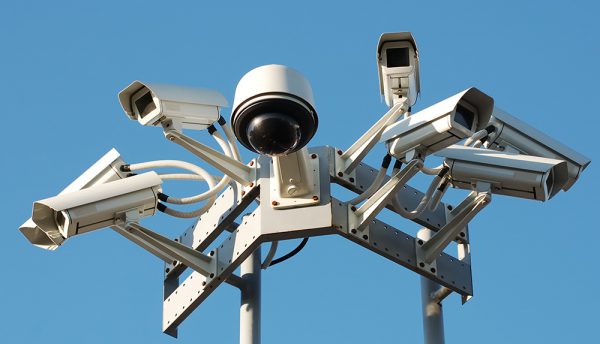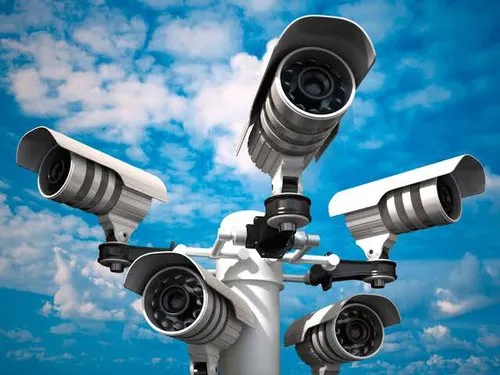There are several ways to protect your home or business, but one of the most surefire methods is outdoor security cameras. Whether prior generation or brand new, outdoor surveillance cameras have proven to be one of the most effective measures in multiple avenues along with security. Here are several benefits that come with adding outdoor cameras to your property or business:
- Access and perimeter monitoring
- Can help reduce insurance costs
- Helps with company policy adherence
- Offers monitoring of property labor
- Helps indicate possible issues or negative occurrences
- Proven deterrence of criminal activity
- Provides proof against illegal activity
As seen, these perks and more are excellent reasons why to update your security with surveillance. To expand on the presented points, businesses will enjoy an advantage from indoor and outdoor security cameras not simply through the prevention of criminal activity but also as a tool to help encourage policy adherence and safety. For example, according to the National Security Council, 4,640,000 medically consulted injuries occurred in America during 2019, with deaths totaling 4,572. Specifically, the top three injuries of the larger number are:
- Overexertion
- Falls
- Equipment or accident accident
Whereas safety policies can only get a business so far for individual workers, indoor and outdoor security cameras provide an excellent method to improve performance across the board constantly. That not only includes safety but also professional processes and training for incoming employees or contractors. Overall, a company can retain high standards and keep employees safe with the addition of surveillance.
While the benefits are distinctly different, the average household can also improve with the addition of surveillance. Homeowners will also enjoy a far safer environment in their abode after installing any sort of security measure. With houses having a security system being 300% less likely to be burglarized. Furthermore, the University of North Carolina found that 50% of burglars would avoid locations with security cameras. Property owners can thereby enjoy peace of mind to a greater extent when a security apparatus is properly installed.
Do outdoor security cameras have audio?
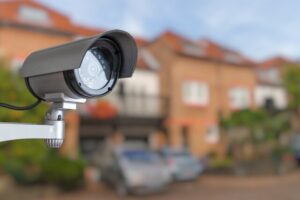
Typically, true outdoor security cameras do not feature internal functionality with audio recording or production unless specified to the contrary. Still, it is becoming more common with present models and those that are in development. However, a surveillance camera that does not have audio capabilities can easily be rectified through the attachment of an outdoor microphone. Furthermore, there are outdoor cameras that feature such a capability like doorbell and access control cameras.
When specifically referencing doorbell cameras, it should be noted that while they are generally capable of audio, that is not typically their specific purpose. Unlike outdoor security cameras, doorbell cameras fit more of a role for access control, while the former fit multiple functions. The devices, at most, use two-way communication to approve or deny visitors of their purpose.
Regarding why an outdoor security camera would have audio capabilities, the feature provides more detail that the surveillance device may not necessarily obtain. For example, conversations, out-of-frame noises or detail, and detection activation before an event occur for full context. For further information on products with audio capabilities, reach out to our sales team today and enjoy all of the products we have to offer you!
How long does footage stay on outdoor home security cameras?
Most security cameras, except for IP security cameras, do not keep on-board recorded footage. For most security camera systems, that answer is dependent on the amount of space present in the central recording device that can be a network video recorder (NVR), digital video recorder (DVR), or dedicated computer. For closed-network security systems, for example, a digital video recorder serves the primary purpose of processing and storing footage captured by the surveillance devices. That is in contrast to the newer generations of security camera systems, including internet protocol (IP) cameras and network video recorders. For further information discussing recording devices, Eagleeyesecuritysystem Security Cameras has already covered the comparison between DVR versus NVR devices.
IP cameras can be distinctly different due to the features that allow for internal processing of captured data and limited footage storage. This does not necessarily mean there is more space for video footage across the board, but it does mean that the system can function without a central recorder. In addition, the network video recorder, which these cameras can feed data into, does not have to strictly be wired to each camera as seen with prior generations of systems. Eagleeyesecuritysystem Security Cameras has a much more detailed examination and comparison of IP security cameras and closed-network cameras.
When it comes to either specifically being outdoor security cameras and how long each retains footage, Eagleeyesecuritysystem Security Cameras has an excellent tool in that regard with the Security NVR Storage Calculator. Strictly speaking, the amount of time a system keeps footage depends on:
- Number of cameras
- Days of footage
- Resolution
- Frame rate
- Expected activity level
- Encoding platform
As a rule of thumb, cameras with a lower frame rate and resolution send data that takes up less space, while those with higher qualifications take up more. Contact our sales team for further information!
How long does an outdoor security camera last?
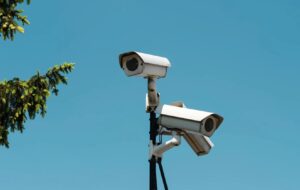
Outdoor security cameras can last up to and over ten years when kept in reasonably good condition. However, unlike other types of cameras, such devices are much more affected by the environment they inhabit. For example, an outdoor camera will last longer in an inland environment and have a reduced lifespan in coastal areas. While there are specializations for other environments, factors will include:
- Direct sunlight
- Heat
- Cold
- Snow
- Rain
- Hail
- Debrie from wind
Unlike other aspects like your roof, walls, or entrances, your outdoor security cameras have more than one way of being monitored. Not only through physical inspection but also through the central monitoring system often used through the NVR, DVR, or specialized computer. However, it is best to regularly monitor your outdoor security cameras every so often.
While more durable, outdoor security cameras are not immune to tampering either. However, as seen in our outdoor security cameras section, devices installed outside are much more durable than their indoor counterparts. Instead of having an exterior of plastic, outdoor devices typically have metal to protect them and a design resistant to moisture or rainwater. The difference in design does not necessarily mean one will last longer than the other; however, it just performs better in their specific environment.
Do outdoor cameras record all the time?
As mentioned above, most surveillance cameras do not necessarily handle and manage the recording aspect of the security system. However, modern indoor and outdoor security cameras are capable of multiple different methods of constant surveillance that have varying levels of storage space parameters but are each effective in their own right. These options include:
- Alarm or software activated recording
- Continuous video recording or CVR
- Motion-activated recording
Depending on the camera, any of these methods of regular recording are set either through the device itself or through the central recording system. Motion activation, for example, in outdoor security cameras, requires specific software in the camera and the managing system, while usually CVR typically only requires the system to be active. Newer age cameras can also send video footage directly to a cloud database, sometimes not requiring a central recording device.
Are outdoor security cameras legal?
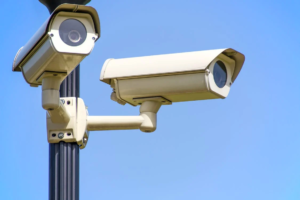
When specifically referencing the legality of outdoor security cameras, there are few or no laws prohibiting the use of, especially when discussing personal property. However, that is not the case when focusing on each state. While most states generally agree that homeowners may have surveillance on their property, the specific capabilities are subject to a state-by-state basis.
Texas, for example, is a one-party consent state when it comes to recording communications and is absolute in allowing a homeowner to install outdoor security cameras. California, in contrast, is a two-party communication state and typically has more limitations when considering security on properties depending on the environment.
Therefore, the best way to know if it is legal for you to get the best outdoor security camera system onto your property is to become educated on the local and state laws. While Eagleeyesecuritysystem Security Cameras can assist you in this endeavor, we encourage each customer to be familiar with their state laws.
How long do batteries last in outdoor security cameras?
Batteries used for wireless security cameras can last a variable amount of time depending on the model and system; however, it is not unusual for a battery to last around a year. With that said, outdoor security cameras that run off of disposable or rechargeable batteries are much less reliable to devices with a direct connection. Additionally, as mentioned in a past post highlighting popular Ring Doorbells, security cameras that use batteries typically are less reliable than traditional surveillance cameras that feature bullet or dome designs.
That is because traditional indoor and outdoor security cameras feature much more functionality not found in battery-powered cameras. While motion activation is a shared quality, for example, traditional security cameras can go further with facial recognition, license plate tracking, infrared, and more. In addition, whereas battery-powered cameras might require a specific environment to function, bullet and dome cameras can come specialized for adverse environments and last much longer to boot.
Do all outdoor security cameras have to be plugged in?
As mentioned above, not all security cameras require a direct plug-in to be functional, but those that are not are typically more advanced and feature more functionality. Furthermore, security cameras directly connected to the internet through an ethernet cable function far better than their wireless counterparts. This can not only be seen when there are connectivity issues or complete loss of wireless connectivity but also through the transfer of video footage and the weight it puts on the local network.
How do I hide the wires from my outdoor camera?

When using even the best outdoor security camera system on your property, you will likely notice signs of installations. When it comes to installations provided by Eagleeyesecuritysystem Security Cameras, there are few points where wires can be accessed externally. Our professional installing team is available to residents of Dallas-Fort Worth using wire covers that make tampering difficult without heavy-duty equipment.
When it comes to hiding your wires leading to your outdoor security cameras, we absolutely stress wire coverings be installed to keep your system secure. However, when it comes to making the system look better aesthetically, such solutions can include:
- Painting or shading points of contention
- Installing false walls or ceilings
- Plant vines or applicable plants
- Run cabling through the wall
Homeowners or businesses can quickly implement these solutions and more with successful results. Furthermore, Eagleeyesecuritysystem Security Cameras will again stress that having wiring openly displayed and accessible is an entirely easy way to nullify any connected outdoor security camera. The most effective method to hide wiring and keep the system safe from tampering in that regard is to run the cables through the wall when the installation is applied onto a primary structure. Furthermore, when that is not an option, the wiring should always have a durable cover.
Do outdoor security cameras need WiFi?
Typically, outdoor security cameras that are only used for recording do not necessarily require WiFi. An example of that can be seen when directly connected cameras experience a loss in a wireless network. The cameras will still transmit recorded footage to the recorder; the only difference is there would not be accessing them remotely. However, features like remote streaming, alert notifications, and more will need such a connection either directly through the camera or at the central recording system.
Eagleeyesecuritysystem Security Cameras will always suggest a direct connection between your security camera system and router or switch. While a wireless connection is easy with the present generation of outdoor security cameras, a direct link provides unmatched security and allows for a reliable connection that can only be lost by losing power or tampering.
Do outdoor security cameras slow down your internet?
Whereas some sources will assert indoor security cameras and outdoor security cameras will not have any effect on a local wireless network, that is not actually true. Surveillance cameras that are wireless and rely on capabilities related to that lack of wiring, in general, will put a drag on the local internet system. Furthermore, when remote viewing is a capability, the local network will be much more devoted to the security camera system than other devices. This means streaming entertainment, gaming, and other services that require an internet connection with face lagging, buffering, poor quality, and more. The proper method to prevent such a problem is to use a direct wired connection with your security cameras by ethernet or coaxial cable.
What Internet speed is needed for security cameras?
Experts in the security industry will agree that the minimum internet upload speed required for indoor and outdoor security cameras is five megabits per second. That upload speed will work for remote viewing but at sub-stream or lower resolutions. Eagleeyesecuritysystem Security Cameras actually provides a calculator for this exact question with our Bitrate Calculator. The three factors that play into what upload speed is required for your security camera system are:
- Number of cameras
- Resolution
- Encoding
Our bitrate calculator includes all three of these factors and will provide you with the exact upload speed required for quality footage over a wireless connection, remote streaming, and more. For more information on what is needed for an indoor and outdoor security camera system, do not hesitate to contact our sales team today!
Does heat affect security cameras?
Heat will affect all electronics to some degree, with overheating being a possible issue with outdoor security cameras. Typically, devices like IP security cameras and those of the like will have an internal fan to cool the system when overheated within a specific margin. For more extreme heat, extreme weather enclosures for a camera or specialized cameras may be required for environments with unusually high temperatures. With that mentioned, outdoor security cameras will typically be durable enough in hotter climates, especially when installed in cover.
Will the cold affect outdoor security cameras?
Entirely different from heat when considering electronics, protecting outdoor security cameras from the cold comes with its own string of challenges. This is especially true when considering ice and snow. Cameras specifically designed for such climates are known as arctic security cameras, which are highly capable after installation in environments that regularly experience frigid temperatures. The capability comes from an internal heating system combined with an exterior built with insulation to regulate internal temperature better. These devices are also more resistant to ice, snow, and lens fogging. While more expensive, this surveillance device will last much longer than the alternative cameras, which will become inoperable against freezing temperatures.
How do I protect my outdoor security camera from rain?
Generally, outdoor security cameras feature a natural resistance or outright immunity to rain. While not naturally waterproof, the devices will withstand normal weather conditions but may have certain software functions may be hindered. In addition, security cameras will be destroyed by lightning from thunderstorms. It should also be noted that indoor security cameras will not withstand rain and should not be used outside.
Laws on Outdoor Surveillance Cameras for Home
Laws on outdoor surveillance cameras for home vary greatly depending on the country, state, and even city you live in. However, there are common themes in many jurisdictions:
- Invasion of privacy: In general, you are not allowed to point your camera at places where people have a reasonable expectation of privacy. This might include your neighbor’s house, bedroom windows, or bathrooms.
- Consent: In some areas, you might be required to get consent from people before recording them. This could mean you need to put up signs informing people that they are being recorded.
- Audio recording: Laws around audio recording are often stricter than those around video recording. In many places, it is illegal to record conversations without the consent of all parties involved.
- Public vs. private property: You are generally allowed to record anything that is happening in a public space. However, the laws become more complex when dealing with private property.
- Use of footage: There may be restrictions on how you can use the footage you collect. For example, it might be illegal to post it online or use it for commercial purposes without consent.
- Data protection: In some regions, like the EU, you have to comply with data protection laws, like the General Data Protection Regulation (GDPR). This means you have to protect the data you collect and only keep it for as long as necessary.
It’s always a good idea to consult with a legal professional in your area to make sure you are complying with all local laws.
Why is outdoor surveillance necessary?
Outdoor security cameras benefit home and business owners with an enhanced level of security that is not found without. Unlike past generations of security, present surveillance cameras no longer need a dedicated team to monitor them but can be managed by a single resident of a home or employee in a company. In short, a home or business owner can enjoy peace of mind with security cameras. Especially when devices are outfitted with modern software, a security system will quickly help keep an area safe and protected. If you live in Dallas-Fort Worth, Texas, you can easily get the best security camera system installed onto your home or business by the Eagleeyesecuritysystem Security Cameras professionals. Our team can answer your questions, help craft a system specific to your needs, and promptly make the installation. Contact us today!

